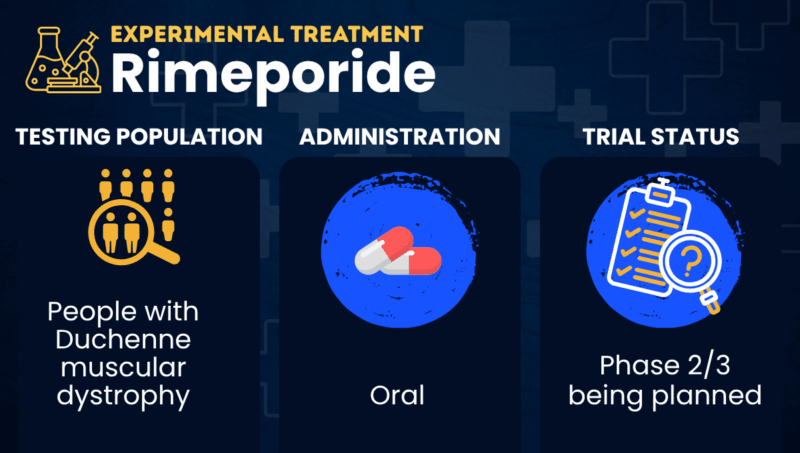Rimeporide for Duchenne muscular dystrophy
Last updated Oct. 16, 2025, by Marisa Wexler, MS

What is rimeporide for Duchenne muscular dystrophy?
Rimeporide, formerly known as EMD-87580, is an experimental oral therapy designed to preserve heart function and limit muscle damage in people with Duchenne muscular dystrophy (DMD).
The therapy is being developed by Esperare Foundation, a not-for-profit organization. While Esperare has been working on the design of a future Phase 2/3 trial of the therapy, the organization is seeking a commercial partner to fund and advance rimeporide into the next stages of development. Rimeporide was initially developed for chronic heart failure by Merck KGaA, which entered into a license agreement with Esperare in 2013.
At the molecular level, dysregulation of pH — that is, the acidity or alkalinity within or outside cells — is a feature of several diseases. Rimeporide blocks the activity of the sodium-proton exchanger isoform 1 (NHE-1), a protein that helps regulate the pH balance inside and outside the cell. By blocking this protein, the treatment seeks to help normalize the pH inside cells, thereby reducing damage to skeletal muscles (the ones that move the body), along with cardiac (heart) muscles and the diaphragm, which is the main muscle used for breathing.
Rimeporide, intended as a treatment with no restrictions on age or DMD-causing mutations, is to be started right after signs of heart muscle fibrosis (scarring) are found. According to Esperare, the therapy is meant to be combined with other treatments, including dystrophin replacement therapies that generally aim to address the lack of functional dystrophin protein that is the underlying cause of DMD.
Therapy snapshot
| Treatment name: | Rimeporide |
| Administration: | Oral capsules |
| Clinical testing: | Completed a Phase 1b trial; a Phase 2/3 trial is being planned |
How will rimeporide be administered?
Rimeporide is being developed as a daily oral therapy.
In an early trial, it was tested at multiple dosages that ranged from 50 mg to 300 mg, three times daily. Participants were dosed according to weight. Those weighing 30 kg — about 66 pounds — or less got one dose, and those weighing more got a higher dose. The highest tested dose level was 200 mg three times daily for lighter patients and 300 mg three times daily for heavier people.
As the treatment has only completed early clinical testing, the selected dose and dose regimen of rimeporide to be used if and when it is approved by regulatory authorities remain to be determined.
Rimeporide in clinical trials
Esperare conducted an open-label Phase 1b clinical trial (NCT02710591) in 20 boys with DMD, ages 6 to 11, who were able to walk. The articipants were given various doses of rimeporide for four weeks.
- The trial primarily aimed to assess the safety of rimeporide therapy. Results showed it was well tolerated overall, with no serious side effects related to the treatment and no study withdrawals due to side effects. Dose adjustments did not seem to be necessary according to body weight. There was preliminary evidence of a biological effect, with rimeporide treatment reducing levels of blood biomarkers of muscle damage and inflammation.
Esperare is currently working on the design for a Phase 2/3 clinical trial of rimeporide. The organization also seeks a commercial partner and/or funding to make further clinical development of the therapy possible.
Rimeporide side effects
Adverse events deemed possibly related to rimeporide treatment in an early clinical trial included flushing, hives, and the common cold.
Muscular Dystrophy News is strictly a news and information website about the disease. It does not provide medical advice, diagnosis, or treatment. This content is not intended to be a substitute for professional medical advice, diagnosis, or treatment. Always seek the advice of your physician or other qualified health provider with any questions you may have regarding a medical condition. Never disregard professional medical advice or delay in seeking it because of something you have read on this website.
Recent Posts
- How AI can support my daily life with Duchenne muscular dystrophy
- Ahead of this year’s MDA Conference, association’s CEO speaks of ‘hope’
- A blind date with a book encourages me to dust off my social life
- New research reveals protein pathway that can slow muscle repair
- Dreaming of solutions to the Olympic-sized challenges of FSHD
